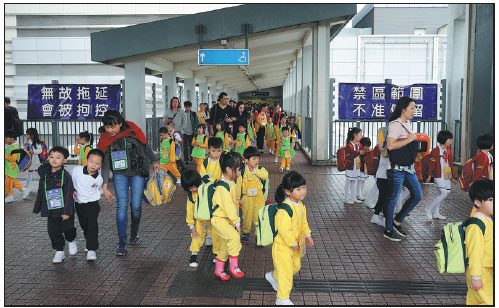
Back in 2013, lawmaker Ip Kwok-him, a Hong Kong deputy to the National People's Congress, took the issue further by proposing that not only should those students be accepted at Shenzhen's public schools, but that Hong Kong-style schools should be built in the city to offer the Hong Kong curriculum and better cater to their needs.
However, the proposals seem far from realistic because the Hong Kong education system can't be imported to the mainland exactly as it is, which would compromise the wishes of parents to choose it rather than schools across the border, according to Jeff Leung Pingkin, a spokesperson for the Concern Group on Policies for Cross-border Students, an NGO in Hong Kong which monitors cross-border education.
In 2013, the Hong Kong government introduced a "zero delivery quota", to redress the balance after a 2001 ruling by the Hong Kong Court of Final Appeal granted permanent residence to all infants born in the city. The ruling led to an influx of non-locals who wanted their children to be born in the city.
More than 202,300 non-local children had been born in Hong Kong by the time the ban was imposed. They have permanent residence, but their parents, who are mostly from the mainland, don't, so the children live in Shenzhen and cross the border every day to go to school.
The number of children crossing the border for schooling will peak in the 2018-19 school year, before gradually decreasing, according to the Hong Kong Education Bureau, inane-mailed reply to questions from China Daily.
The bureau said the government has no plans to build Hong Kong-style schools on the other side of the boundary, saying the surge in demand for cross-border school places is "transient". It also cited regulatory and operational difficulties, and the financial implications for publicly funded schools outside Hong Kong.
The bureau has encouraged Hong Kong-born children who live in Shenzhen to attend primary schools in the mainland city, as provided by the Classes for Hong Kong Students Program, which make provisions for children born in the city to be educated in Shenzhen.
In 2013, the program was extended to children whose parents are not permanent residents of Hong Kong, and this academic year has seen 3,100 Hong Kong-born students in Shenzhen being taught in privately operated establishments known as "Minban" schools.
Although she agreed that more options in Shenzhen would help the children, Zou won't let her son attend a public school in the city.
"I never thought about putting him in a school in Shenzhen - neither the public schools, nor the international ones," she said.
Leung said many parents made a conscious decision to give birth in Hong Kong because they want the next generation of their family to be educated in the city's more cosmopolitan, international environment.
Some of the parents regret having no option but to send their children to Hong Kong, according to Leung, who is assisting several cross-border students. The children are not allowed to study at public schools in Shenzhen, which have a limited number of places for children with hukou, or residency permits, so the only alternatives are private or international schools, which are far beyond the price range of most families.
Frustrations grow
That means crossing the border for education. However, the process is problematic, with a long commute, eating on the move, less sleep and, for many children, no after school activities. Moreover, some of the children find the cultural and language barriers frustrating.
"We would not go back to Shenzhen even if the local public schools could accept us," said the grandmother of a young girl as they approached the checkpoint between the two cities. The woman, who only gave her surname as Pi, said neither her daughter nor her son-in-law is a Hong Kong resident.
Pi had just one aim when she traveled from her hometown in Heilongjiang province in the far northwest to the very south of the country -to escort her granddaughter to a kindergarten in Hong Kong every day.
The roundtrip takes more than four hours, but "it doesn't matter", according to Pi, who said the schools inHong Kong will give her granddaughter "a better education and, therefore, a better future".


















































